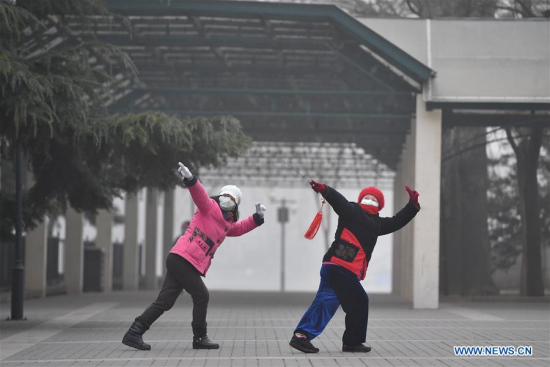
Women do morning exercises in Beijing's Taoranting Park in 2016. (Photo/Xinhua)
Winter shortages
This year's rapid shift from coal to natural gas has led to shortages. According to the Ministry of Environmental Protection, around 100,000 families and some schools temporarily lacked heat in December. The government stepped in with a combination of measures, including allowing some additional use of coal and moving natural gas from industrial uses to residential and from southern China to the north. The National Development and Reform Commission also ordered Beijing to restart a coal-fired power plant that had been shut down in March last year.
Natural gas prices soared in December. The price of liquefied natural gas in China jumped from 4,000 yuan ($605) per metric ton to more than 10,000 yuan per ton. However, the price was brought down to 5,613.6 yuan per ton by mid-January, according to data from the National Bureau of Statistics.
Han Xiaoping, chief information officer of China Energy Net Consulting, said the current natural gas shortage is due to insufficient domestic gas resources and the lack of distributed gas storage infrastructure, especially underground storage tanks.
In addition to building more natural gas infrastructure, the strategy for alleviating future shortages is to concentrate natural gas use in residential and industrial uses, where it makes the most difference in reducing pollution. The modern ultra-supercritical coal-fired electrical power plants that China is building are not as clean as natural gas turbines, but they are far cleaner than the very small burners, so it is seen as making sense to concentrate coal mostly in electrical power generation, as is now done in developed countries.
Lauri Myllyvirta, a coal and air pollution expert at Greenpeace in Beijing, said: "Shifting small boilers or household heating from coal to gas definitely leads to big air quality gains. That is the sector where natural gas makes most sense in China. If you look at what happened in the last winter, the local policies were very focused on gas. In the next years, the policy is more balanced between geothermal, biomass, electric heating and gas. I definitely think that that broader mix, including emissions-free sources as well, will be better and might avoid some of the problems we saw this winter."
He also said that the government's 2021 heating plan, which stiffens building insulation standards, will require retrofitting the insulation of rural houses, so gas demand from heating will decline. This ties in with the broader policy of upgrading industrial transformation.
"If you think about where China is at right now, there is a need to scale down construction and the reliance on infrastructure projects and real estate to drive growth. At this point, training some of the people in the construction sector to do retrofits would make an enormous amount of sense," Myllyvirta said.


















































